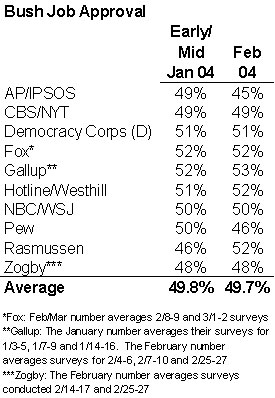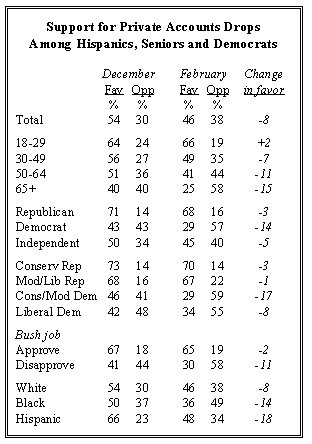There has been quite a bit of polling released in the last few weeks on the Social Security debate. While there is much debate about the consequences, data from multiple sources show that while awareness of the debate is growing and support for private accounts is falling, overall support for the President remains remarkably steady. Here are the specifics:
1) Awareness of the Social Security debate is growing — According the most recent survey by the Pew Research Center, the percentage of Americans who have heard “a lot” about President Bush’s proposal for private retirement accounts has grown 20 percentage points, from 23% in December to 43% in February.
While the Social Security debate is getting more attention, it would be wrong to assume that most Americans are following every detail of the debate. In the Pew study, 35% say they have heard “a little,” and 21% have heard nothing at all.
Similarly, on a Fox News poll question that asked respondents to choose between two statements, 37% said they “generally understand how the proposal to let people invest a portion of their Social Security contributions in personal or private accounts would work.” The majority (59%) said they “need more information to understand the proposal.”
2) Support for personal accounts is declining — On the CBS/New York Times surveys, the percentage that describes “allowing individuals to invest a portion of their Social Security taxes on their own” as a “good idea” has fallen from 49% in November to 45% in mid-January to 43% in late February.
In the Pew Study, support for the personal accounts proposal has fallen from 54% in December to 46% in February (their full description: “a proposal which would allow younger workers to invest a portion of their Social Security taxes in private retirement accounts, which might include stocks or mutual funds”).
The NBC News/Wall Street Journal poll has the percentage supporting a personal accounts proposal dropping from 46% in January to 40% in mid February.
Also, as is typical when voters begin to pay more attention, question wording may be having less of an effect producing divergent results. MP scanned the Polling Report’s powerhouse summary of surveys on Social Security, and sees support for the personal account proposal falling into a narrow range between 39% and 45%. Compare that to the huge variations in support observed by the Pew Center in their January report that I attributed mostly to the number of Americans without previously held opinions on the issue.
3) President Bush’s overall job rating is unchanged — Step back and look at recent measurements of Bush’s job rating as reported by RealClearPolitics, and you do not see much change. Professor Pollkatz’ graphical presentation of the Bush job approval rating since January is a picture of random noise. The monthly average prepared by Democracy Corp’s Karl Agne (based on all polls publicly released each month), shows the President’s average approval rating at 50.9% in January and 50.6% in February. MP tried to be a bit more apples-to-apples, and calculated his own average limited to those pollsters in the field in both months and got a virtually identical result. The average approval rating was 49.8% in January and 49.7% in February (amazingly close, especially considering the added fuzziness of rounding error — we really should round those average percentages off to the nearest whole percentage point).

So why are Bush’s numbers steady while support for personal accounts is falling? Why, as Democratic pollster Stan Greenberg and his Democracy Corps colleagues ask, “have the Republicans not crashed and burned? Why has the public not taken out their anger on the Congressional Republicans?”
One big clue comes from the recent Pew Research Center analysis. They show that much of the decline in support for personal accounts comes from older voters and Democrats. Here is the way they characterized the trend (I have also copied the table from their report below):
Over the past two months, support for private retirement accounts has declined among most demographic and political groups. But the erosion has been especially steep among Hispanics (down 18 points since December), conservative and moderate Democrats (down 17 points), and people age 65 and older (15 points).
The accompanying table from the Pew report (copied below) also includes this telling bit of data: Support for private accounts fell by 11 points (from 41% to 30%) among those who already disapprove of the President’s job performance, but by only two points (from 67% to 65%) among those who approve.

[In the Democracy Corps memo, Greenberg provides much more data and a more in-depth explanation for the lack of deterioration in Bush’s ratings. In a response, Republican pollster David Winston takes great exception to, among other things, Greenberg’s premise that Bush’s Social Security proposals are “crashing against the wall of the public’s deep doubts.”]
Earlier this week, when it seemed the Republicans were about to postpone voting on the private accounts for at least a year, The New Republic‘s Noam Scheiber asked hypothetically, “whether Republicans will pay a political price for having raised privatization as an issue and then abandoned it when the going got tough?” This data provides an answer: Not very much, at least, not yet. I would say Scheiber had it exactly right when he concluded:
It’s not clear that Democrats benefit directly from killing privatization so quickly. They could accuse the GOP of wanting to cut benefits on the campaign trail next year. But, in the absence of an actual proposal, it’s not clear that this claim has any more resonance than it would in an election cycle where the GOP didn’t try to privatize Social Security.